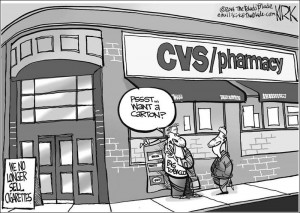CVS Caremark, the second largest US pharmacy chain (originally founded as a non-drugstore operation, gradually shifted its marketing direction to a pharmacy operation), announced early this year that cigarettes and other tobacco-related products will no longer be sold at its stores all over the nation. While this decision seems to coincide with Freeman’s Stakeholder Theory in which he addresses the principle of “who really counts” (in this case the general public), in my opinion, CVS also indirectly adopts the concept of Friedman’s doctrine.
It is clear that CVS is looking at something bigger, something more ambitious by quitting selling tobacco products. Through the withdrawal of competing in the tobacco markets, CVS has won consumers’ confidence. Consequently, the corresponding rise in its good reputation for creating a healthier society lays the groundwork for the company’s future extensions (pharmacies etc).
In addition, “a shortage of primary care doctors is turning drugstore chains into big players in the nation’s health care system.” CVS undoubtedly sees the market opportunity and profitability in this deficiency. In conclusion, CVS has successfully positioned itself in such as way that both social responsibility/ethics and increased profit margin are achieved.
Indeed, the $2 billion loss in revenue is just a small dent in its $123 billion overall sales.

Recent Comments